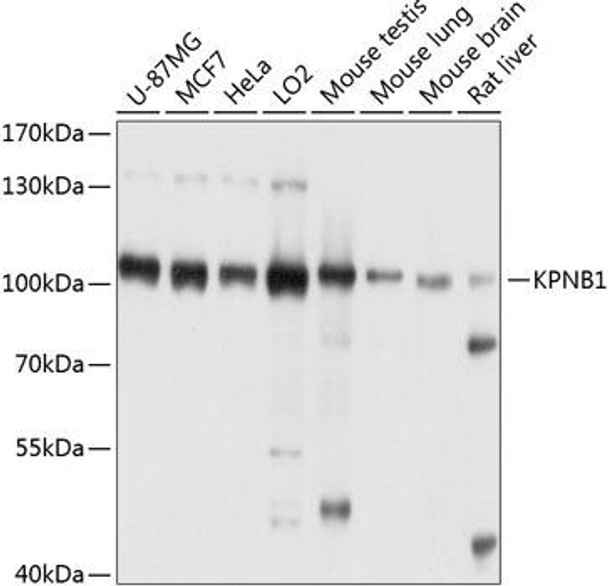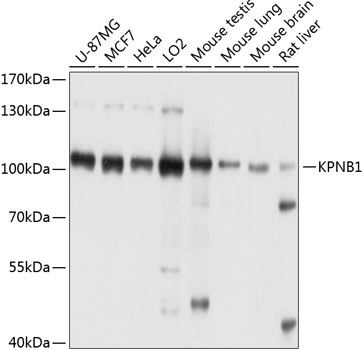| UniProt Protein Function: | Functions in nuclear protein import, either in association with an adapter protein, like an importin-alpha subunit, which binds to nuclear localization signals (NLS) in cargo substrates, or by acting as autonomous nuclear transport receptor. Acting autonomously, serves itself as NLS receptor. Docking of the importin/substrate complex to the nuclear pore complex (NPC) is mediated by KPNB1 through binding to nucleoporin FxFG repeats and the complex is subsequently translocated through the pore by an energy requiring, Ran-dependent mechanism. At the nucleoplasmic side of the NPC, Ran binds to importin-beta and the three components separate and importin-alpha and -beta are re-exported from the nucleus to the cytoplasm where GTP hydrolysis releases Ran from importin. The directionality of nuclear import is thought to be conferred by an asymmetric distribution of the GTP- and GDP-bound forms of Ran between the cytoplasm and nucleus. Mediates autonomously the nuclear import of ribosomal proteins RPL23A, RPS7 and RPL5. Binds to a beta-like import receptor binding (BIB) domain of RPL23A. In association with IPO7 mediates the nuclear import of H1 histone. In vitro, mediates nuclear import of H2A, H2B, H3 and H4 histones. In case of HIV-1 infection, binds and mediates the nuclear import of HIV-1 Rev. Imports SNAI1 and PRKCI into the nucleus. |
| NCBI Summary: | Nucleocytoplasmic transport, a signal- and energy-dependent process, takes place through nuclear pore complexes embedded in the nuclear envelope. The import of proteins containing a nuclear localization signal (NLS) requires the NLS import receptor, a heterodimer of importin alpha and beta subunits also known as karyopherins. Importin alpha binds the NLS-containing cargo in the cytoplasm and importin beta docks the complex at the cytoplasmic side of the nuclear pore complex. In the presence of nucleoside triphosphates and the small GTP binding protein Ran, the complex moves into the nuclear pore complex and the importin subunits dissociate. Importin alpha enters the nucleoplasm with its passenger protein and importin beta remains at the pore. Interactions between importin beta and the FG repeats of nucleoporins are essential in translocation through the pore complex. The protein encoded by this gene is a member of the importin beta family. Two transcript variants encoding different isoforms have been found for this gene. [provided by RefSeq, Feb 2013] |
| UniProt Code: | Q14974 |
| NCBI GenInfo Identifier: | 20981701 |
| NCBI Gene ID: | 3837 |
| NCBI Accession: | Q14974.2 |
| UniProt Secondary Accession: | Q14974,Q14637, Q53XN2, Q96J27, B7ZAV6, D3DTT3, |
| UniProt Related Accession: | Q14974 |
| Molecular Weight: | 97 kDa |
| NCBI Full Name: | Importin subunit beta-1 |
| NCBI Synonym Full Names: | karyopherin subunit beta 1 |
| NCBI Official Symbol: | KPNB1 |
| NCBI Official Synonym Symbols: | IMB1; IPO1; IPOB; Impnb; NTF97 |
| NCBI Protein Information: | importin subunit beta-1 |
| UniProt Protein Name: | Importin subunit beta-1 |
| UniProt Synonym Protein Names: | Importin-90; Karyopherin subunit beta-1; Nuclear factor p97; Pore targeting complex 97 kDa subunit; PTAC97 |
| Protein Family: | Importin |
| UniProt Gene Name: | KPNB1 |


